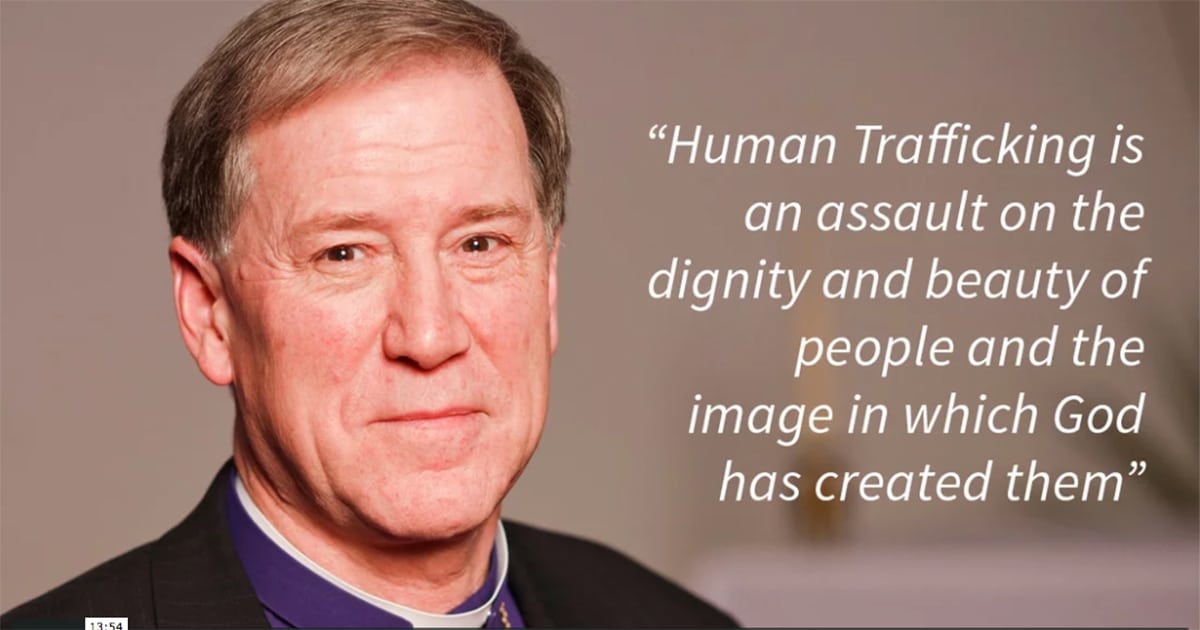The June 2017 meeting of the Council of General Synod saw council members officially endorse Resolution 15.10, the resolution against human trafficking passed in 2012 by the Anglican Consultative Council. Shortly thereafter, the Anglican Church of Canada established a new human trafficking web hub, collecting information and resources to raise awareness of the issue within the church and beyond.
Now, the church is taking another step forward in its fight against human trafficking and modern slavery with the formation of a discernment group led by General Synod Global Relations and Public Witness teams—the members of which will meet this September at Church House in Toronto to assess the current scope of Anglican work in this ministry, identify priorities in this work, and to plot out a detailed plan going forward.
Crucial to this process will be identifying Anglicans involved in work against human trafficking. As a result, the discernment group is calling on all individuals and organizations engaged in this work or aware of initiatives by others to contact group members Andrea Mann or Ryan Weston.
“The data gathering process is a way of beginning to better understand the nature, the incidence, the existence of trafficking and slavery in Canada, how the church is responding to those realities within local communities, and how other people can become involved,” Mann said.
“It’s data that identifies people, ministry, cities and towns, and rural and remote areas in the church where people are thinking about this and responding.”
The discernment group is also interested in hearing from Anglicans who are involved in working ecumenically and in interfaith collaborations, as well as in partnerships with government and civil society.
Hoping to make their work against human trafficking a full communion initiative, members have been conducting discussions with the Rev. Paul Gehrs, assistant to the bishop for synodical relations at the Evangelical Lutheran Church in Canada, about potential Lutheran involvement. “Human Beings—Not For Sale” is one of the subthemes of the Lutherans’ commemoration of the 500th anniversary of the Protestant Reformation.
With the ongoing accumulation of data before and after the September meeting, one goal for the web hub is to feature a map pointing to the locations of initiatives against human trafficking by Anglicans across Canada, providing a useful visual resource that encourages people to connect with one another.
One example of work against human trafficking comes from a member of the discernment group, Caitlin Beck, who also serves as missioner for children, youth, and families in the Diocese of New Westminster.
In the first week of March, Beck helped organize a delegation of teens and young adults from New Westminster and the Diocese of Niagara to the sixty-first session of the United Nations Commission on the Status of Women (UNCSW61), where human trafficking is often a recurring theme. Many panels and events discussed the need to protect the rights of sex workers and migrant workers and involve them in conversations related to human trafficking.
With the increased focus on trafficking by the church, Beck is currently helping write a letter to the Primate’s office describing some of what the delegation learned at the United Nations.
“I’m actually excited to be able to share some of that as a part of the new discernment group that they’re putting together for this issue,” Beck said.
“I think that’s a really great step that the national church has taken to ensure that we do this work in the right way—in a way that includes the voices of people who are caused the most harm by human trafficking, and that we learn from their experiences and don’t base our actions on assumptions when we don’t have the direct experience. I think that’s a good thing for us to be careful about.”
In terms of working towards the eradication of human trafficking and slavery, Barbara Gosse, chief executive officer of the Canadian Centre to End Human Trafficking and a parishioner at St. Cuthbert’s Anglican Church in Toronto, said that churches often have a reach that other activist groups or police may not have.
“There’s no question that the Anglican Church has a substantial reach across the country, and that faith communities can play a very important part in educating the public, on bringing people together to really look at grassroots efforts that could combat human trafficking,” Gosse said.
“Also, I think faith communities are very respected as being cohesive and organized and caring and positive on some of these socioeconomic issues. So when you have the opportunity to speak to your policy makers and lawmakers and political representatives, I think it brings with it a lot of clout and a lot of credibility.”
Are you active in or aware of work by Canadian Anglicans related to the fight against human trafficking? Email Andrea Mann or Ryan Weston to share your story.
Interested in keeping up-to-date on news, opinion, events and resources from the Anglican Church of Canada? Sign up for our email alerts .

